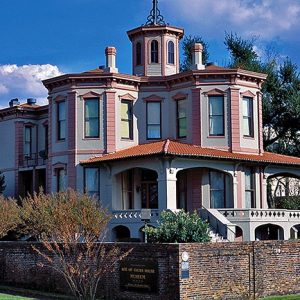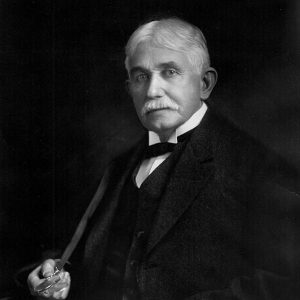calsfoundation@cals.org
Henry Moore Sr. (1844–1922)
Attorney and planter Henry Moore Sr. made his home in southwestern Arkansas and northeastern Texas and was a prominent figure in Lafayette County politics.
Henry Moore (no middle name) was born on December 4, 1844, one of eight children of Presbyterian minister James Wilson Moore and Elizabeth Guild Green Moore at the Moore home named “Ruralia,” near Sylvania in present-day Lonoke County. He was baptized into the Presbyterian Church by the Reverend Alexander R. Banks, a ministerial associate of his father, at Spring Hill Church in Hempstead County on April 15, 1845. He was active in the Presbyterian faith for his whole life. He likely received his early education at Sylvania Academy under the tutelage of his father and later a Dr. D. McFayden, who took over the academy around 1860.
During the Civil War, Moore enlisted on April 30, 1863, at Little Rock (Pulaski County), as a private in Company A, of Colonel Asa Morgan’s Regiment, Twenty-sixth Arkansas Infantry. Shortly after enlistment into the Confederate army, he was sent by special order of Lieutenant General Theophilus Hunter Holmes on special duty in the quartermaster’s department under the command of Major John B. Burton, chief quartermaster at Little Rock. His service record does not indicate the date of his discharge, but he was present on the muster roll as late as February 1864.
After the war, he entered the University of Virginia, where he graduated with a law degree in 1868 and a degree in moral philosophy in 1870. He relocated to “Old” Lewisville in Lafayette County, where he began his law practice and soon became involved in county politics, having been the Democratic nominee for county clerk in 1872. He won the election and served in that office until 1880. Moore’s brother Charles Beatty Moore won election to the office of Arkansas attorney general in 1880, which no doubt strengthened Henry’s political connections. Governor Thomas James Churchill appointed him as delegate to the National Cotton Planters Convention in 1881, and Governor James Phillip Eagle appointed him as delegate to the National Silver Convention held in St. Louis in 1889. Sometime after the founding of the United Confederate Veterans in 1889, he became an active member of the organization.
Moore married Katharine “Katie” Fleming of Lexington, Missouri, in 1873. They had seven children, though only three survived to adulthood: Henry Moore Jr., Mildred Moore, and Charles Beatty Moore II. Henry Moore Jr. eventually became a lawyer and planter like his father and served on the Red River Levee Board.
Moore was instrumental in bringing the Louisiana and Arkansas Railway to Lafayette County, having been in communication with Samuel Wesley Fordyce in the summer of 1882 to discuss its prospects there. He served on the board of directors and as general attorney for the company for many years.
In 1887, Moore and his family moved to Texarkana (Miller County), and he relocated his law practice there. By 1894, the Moore family moved just across the state line to Texarkana, Texas, after purchasing what became known as the Draughon-Moore “Ace of Clubs” House at 420 Pine Street. Moore resided there for the next twenty-eight years.
Though he lived in Texas, he still maintained strong ties to his native state. Early in his residence in Lafayette County, he became a major landholder and planted cotton and corn. According to the Arkansas Gazette, he purchased 6,300 acres of pine timberland in the county. In addition to his law practice, farm, and timber operations, he also owned a mercantile business but seems to have sold it after his move to Texarkana. He served on numerous boards including that of the Arkansas State YMCA, the Inter-State Bank of Texarkana, the Lafayette County Board of Equalization, and the Forrest Land Company.
After a short battle with inoperable bladder cancer, Moore died at his home in Texarkana, Texas, on May 22, 1922, and is buried in Arkansas in the Moore family plot at Sylvania Cemetery in Sylvania.
For additional information:
Draughon-Moore Archives, Texarkana Museums System, Texarkana, Texas.
“Henry Moore of Texarkana Dead.” Arkansas Gazette, May 23, 1922, p. 12.
“Henry Moore of Texarkana Dies.” Arkansas Democrat, May 23, 1922, p. 8.
Melissa A Nesbitt
Texarkana, Arkansas
 Business, Commerce, and Industry
Business, Commerce, and Industry Post-Reconstruction through the Gilded Age, 1875 through 1900
Post-Reconstruction through the Gilded Age, 1875 through 1900 Ace of Clubs House
Ace of Clubs House  Ace of Clubs House
Ace of Clubs House  Henry Moore
Henry Moore 



Comments
No comments on this entry yet.